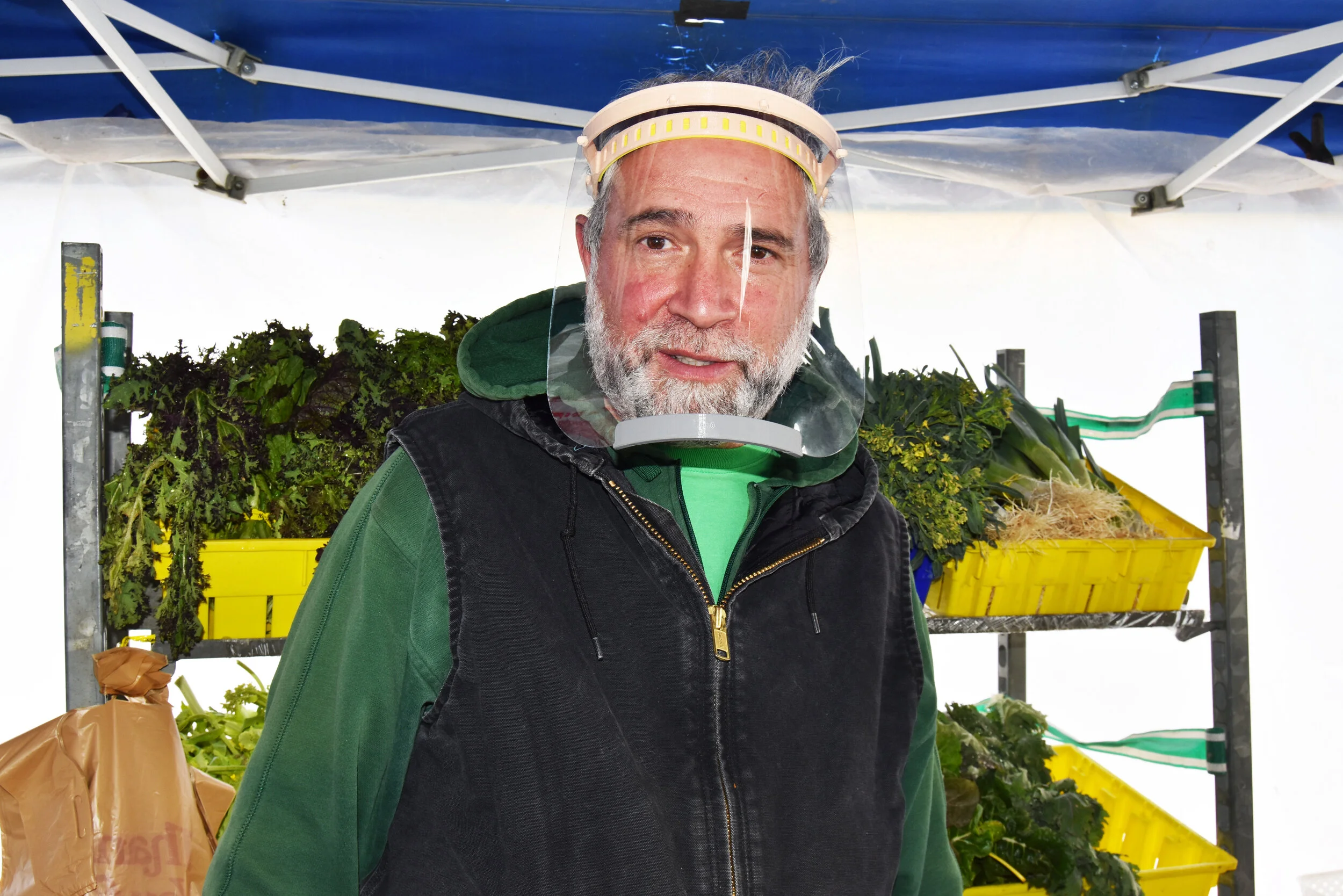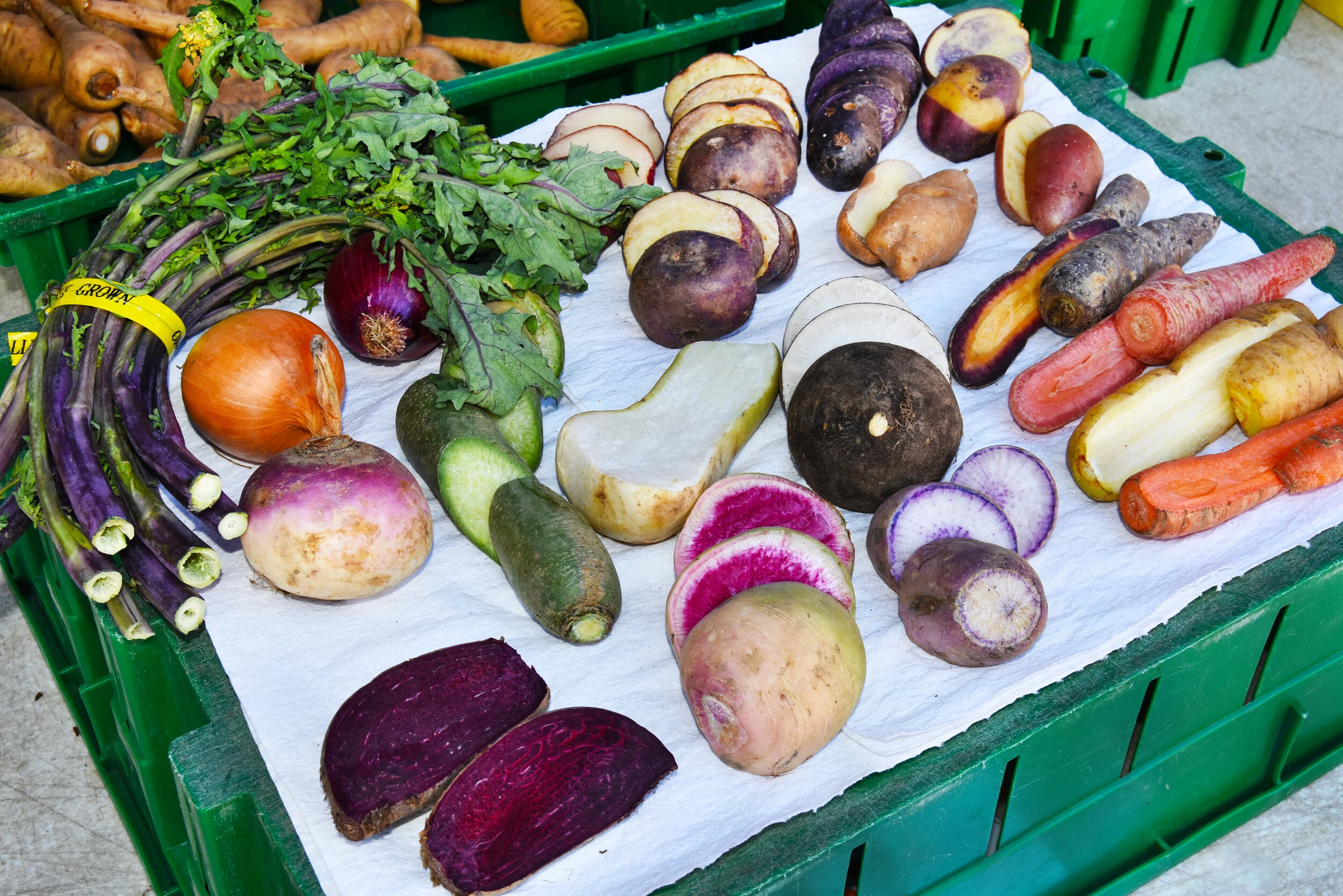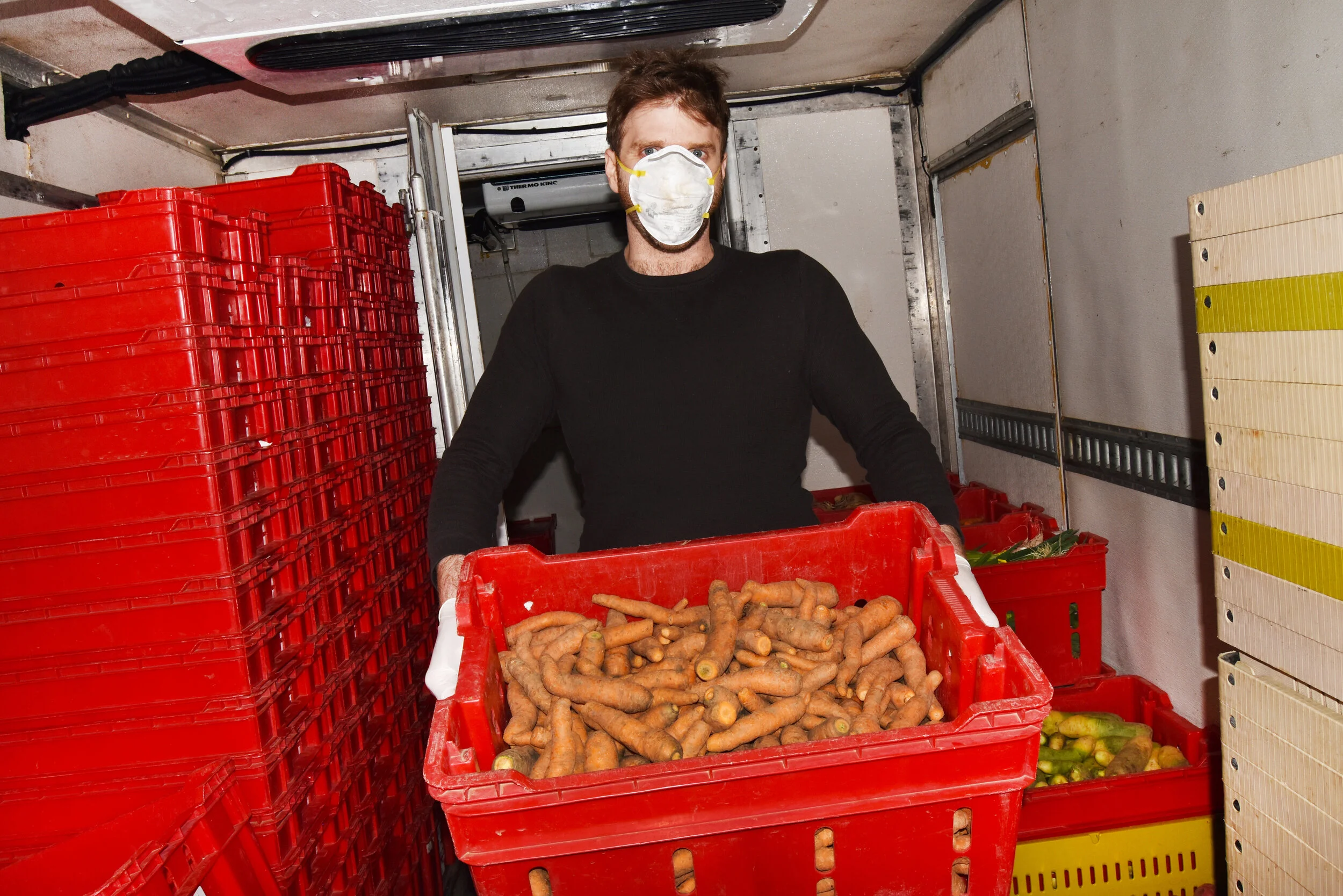A Star Farmer’s Newest Workers: His Former Customers
Chefs from New York’s best restaurants lend a hand at the Greenmarket.
Published on Grub Street on April 23, 2020
At the Norwich Meadows Farm stand in the Union Square Greenmarket, Zaid Kurdieh — who owns the farm with his wife, Haifa — carries an economy-size jug of hand sanitizer. When one of his volunteers pointed out the jug’s pump didn’t work properly, spraying the precious sanitizer in an unpredictable fashion, Kurdieh looked, and got it working properly. “You just have to be nice to it,” he explained.
Norwich Meadows Farm’s root vegetables. Photo: Nina Roberts
By all accounts, being nice — a decent person, a fair businessman — helped Kurdieh become one of the city’s most in-demand purveyors of seasonal, organic produce. Kurdieh’s 230-acre upstate farm, which is located about three and a half hours north of the city, has been a Greenmarket presence for nearly 20 years, and it has counted restaurants like Blue Hill, Gramercy Tavern, and Upland among its customers.
But the coronavirus pandemic shattered the entire restaurant ecosystem, quite literally overnight, leaving Kurdieh with a 60 percent loss of revenue in less than a week. “Everything was shocking,” he says. “These events happened so fast.”
Kurdieh had to move fast, too, to figure out how to get his products to where his customers are: their homes. By late March, he was taking orders for Norwich Meadows produce boxes, costing $50 each. Then, within a two-week period in early April, which Kurdieh described as “an eternity,” and in partnership with a marketing team, he launched Norwich Meadows Box, a subscription delivery service with its own streamlined website, dedicated social media, and multiple options for customers involving Kurdieh’s produce and Greenmarket items like honey and goat cheese. (One upcoming option will include prepared dishes, like roasted-beet salad and spring-onion vinaigrette, from the former Gramercy Tavern chef de cuisine Howard Kalachnikoff.)
Chefs helping at Norwich Meadows Farms. Photo: Nina Roberts
Kurdieh has also brought on some new help. The stand at Union Square is now manned by out-of-work chefs de cuisine, sous-chefs, and a saucier, kitchen pros who worked at restaurants like Per Se, Danny Meyer’s Marta, and the vegetable-centric 232 Bleecker in the West Village, among others. The chefs have temporarily replaced Kurdieh’s regular crew of Egyptian workers who have remained on the upstate farm during the pandemic.
Per Se sous-chef Frederic Aumeunier initially volunteered to help Kurdieh assemble Norwich Meadows “care packages” — 15 to 20 pound bags of produce that Kurdieh gave to anyone who worked at the restaurants he supplied — in mid-March when the shutdown mandate arrived.
Aumeunier, who hails from France and ordered vegetables from Kurdieh while he worked at Per Se, excelled at his first job, and his role quickly evolved into overseeing the assemblage of the new produce boxes. A shift now involves hauling bins of carrots and turnips, or dividing 1,200 pounds of produce into two- or three-pound bags. “Now,” he jokes, “I work more than if I was working in the kitchen.”
Salvadorian Rodrigo Campos, a Per Se saucier, recounts feeling “in love” when Norwich produce deliveries arrived at the restaurant prior to its closing. “So working here at the market, it’s like that feeling — but all day,” he says. Holding a bunch of radishes, he marvels at their neon-red bulbs. “Look at these!”
Now, when Greenmarket customers casually ask how a turnip or beet might be best prepared, or how to use green garlic, they are suddenly surrounded — as “surrounded” as anyone can be in the age of social distancing, anyway — by chefs throwing out suggestions, tips, and recipes, even advice on how to not waste beet greens.
Ethan Frisch, co-founder of Burlap & Barrel at the Greenmarket. Photo: Nina Roberts
The chefs take advantage of Norwich Meadows vegetables, too, making fermented concoctions at home, or kale pesto with the bag of produce Kurdieh gives to them.
Ethan Frisch, a co-founder of the spice company Burlap & Barrel, is one of Kurdieh’s new volunteers, working 60 hours a week. “6 a.m. start times — it’s intense,” he laughs. Still, he says, “As somebody who’s been involved in food and food activism and food systems in various ways for a long time, it seemed like it was a pretty worthy cause — helping farmers get their produce to market, and helping people stuck in New York City get beautiful fresh veggies.”
This new approach to selling, though, also forces Kurdieh and his new staff to consider the ways in which shopping, and eating, might change permanently. When this is over, will we still have the same relationship with restaurants that we did pre-pandemic?
“I find myself obviously feeling down about it,” says Mirra Sims, a sous-chef from 232 Bleecker who thinks fine dining is definitely going to take a big hit and wonders, “Is this the end of neighborhood restaurants?”
Chef Mirra Sims of 232 Bleecker at Union Square. Photo: Nina Roberts
“Is everybody going to just expect that food gets delivered to their homes now?” she continues. “That’s sad not only for those of us who love restaurants and love cooking for people, but also for what that means in terms of how our society socializes.”
For his part, Kurdieh seems willing to adjust accordingly. “Maybe people are going to be eating more at home,” he says, in which case he wants his offerings to facilitate that. “We have this system,” Kurdieh explains, “it’s definitely not perfect by any stretch, but it works at the moment of delivery.”
Frisch says that, no matter what happens, he trusts Kurdieh to do the right thing. He points to the generous care packages Norwich Meadows gave to laid-off restaurant workers: “This was not, you know, a couple of onions in a bag.” It is, Frisch says, part of a stronger sense of commitment. “He’s looking for opportunities to support people within his community,” Frisch offers. “He really works around a deep-seated moral compass.”




